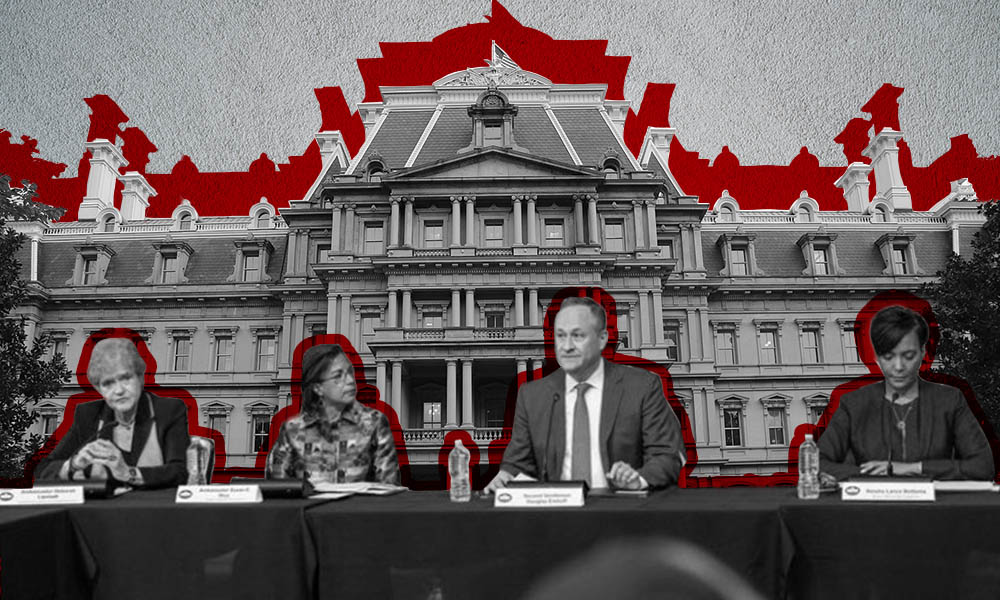

Jewish Politics & Power is published every other week. Sign up for our newsletter for updates.
1. Washington Takes on Antisemitism
With its ornate decorations and side windows overlooking the West Wing entrance to the White House, The Indian Treaty Room, on the fourth floor of the Eisenhower Executive Building in Washington, DC, is ripe with history, from hosting official signing ceremonies to presidential press conferences dating back to the 1950s.
Last Wednesday, the Biden administration chose this venue for its first-ever roundtable on antisemitism, led by Second Gentleman Doug Emhoff. For a meeting full of symbolism, it was an opportunity for the White House to visually convey the importance the administration sees in sending out a clear message against antisemitism.
“An epidemic of hate” is how Emhoff described the rash of anti-Jewish incidents and expressions flooding America in recent months. Deborah Lipstadt, the State Department’s special envoy on antisemitism, drove home the gravity of the situation by telling participants from Jewish organizations gathered around the table how she can no longer condemn foreign countries as sources of Jew hatred, as some of her predecessors have done in the past. “I can’t go to these countries and say, ‘You have a problem.’ Now I have to say, ‘We have a serious problem,’” she said.
The meeting, which lasted about an hour and half, was, according to participants, intimate and uplifting. Jewish leaders representing various denominations and organizations left feeling that they’d been heard and that officials at the highest levels, such as senior White House advisors Susan Rice and Keisha Lance Bottoms, who were in attendance, actually care.
Much of the credit for that goes to Emhoff, who has proven to be a perfect fit for a job he was never officially tasked with: the Biden administration’s top authority on everything Jewish. In his opening address at the roundtable, Emhoff touched on his personal Jewish background and came across as sincere when stating, “I’m in pain right now, our community is in pain,” before concluding: “I’m proud to be Jewish. I’m proud to live openly as a Jew and I’m not afraid. We refuse to be afraid.”
Forms of antisemitism discussed at the meeting demonstrate the different ways in which Jew-hatred impacts all facets of the community: from vandalism against synagogues, which has hit all denominations, to vicious attacks on visibly Jewish individuals, especially in New York, which affect mainly Orthodox Jews, to harassment of Jewish students on college campuses to the recent antisemitic rhetoric from rapper Ye, aka Kanye West, which echoed across the nation and was amplified when former president Donald Trump hosted West and Holocaust-denier Nick Fuentes at his Florida home.
The DC roundtable had no clear bottom line, said participants. Still, participants, both from Jewish organizations and from the administration, left with the understanding that the federal government will be doing more to demonstrate a government-wide approach to the problem of antisemitism, a move that would ensure a coordinated response to expressions of hatred and violence against Jews.
2. Congress gets involved too
Just before the meeting, Congress sent President Biden a request for essentially the same action. A bipartisan and bicameral group of 125 lawmakers wrote a letter last week asking for a “whole-of-government approach” to antisemitism and to “prioritize coordination among all agencies working in this space,” including the departments of Homeland Security, Justice, and Education, among many other agencies that deal with the issue.
3. Moving from words to action
There already exist a number of governmental systems to fight antisemitism: a dedicated office for countering antisemitism overseas; a federal registry of antisemitic incidents run by the FBI (though on a voluntary reporting basis); generous federal grants for increasing security in religious institutions; laws prohibiting discrimination in educational institutions; and, of course, federal hate crime laws, which have proven effective in deterrence and in punishment.
Beyond the formal measures, there is also a broad understanding in the U.S. government, from the president down, that antisemitism is not only unacceptable, but also needs to be actively confronted. This may sound obvious, but it has not always been the case, even a mere half-century ago.
So, what can the government do?
Coordinating between government agencies can help deliver a more effective response. America’s response to the 9/11 terror attacks focused on the lack of interagency coordination to terrorism and improved it significantly. The same approach that delivered results in battling terror can help in the fight against Jew-hatred.
Perhaps the fundamental role of government right now is to serve as the voice of reason and of compassion. Sending a clear message that discrimination and hate against the Jewish community do not have a place in 21st-century America can inspire leaders and chart the course for fashioning locally tailored responses to antisemitic threats, as they present themselves.
4. Trump makes things worse
Donald Trump never apologized for hosting Kanye West and Nick Fuentes at his Florida estate, nor did he utter a word of criticism or condemnation toward West, even as West’s antisemitic rhetoric spun out of control.
That proves to many that Trump is tolerant to antisemitism, at least when it comes from those in his own political sphere. But it’s also just Trump being Trump. If there’s anything America has learned about the former president in the past six years, it’s that “the Donald” never apologizes and never admits to making a mistake. He simply doesn’t have that capacity—even if an apology to the Jewish community is well in place and even when it is clear to all that hosting two avowed antisemites for dinner was a mistake.
Over the weekend, Trump seemed bent on worsening the situation when he chose to criticize not the antisemitic rapper and the white nationalist commentator but rather American Jewish leaders. Accusing Jewish Americans once again of not being “loyal” to Israel, Trump went on to admonish American Jewish leaders, saying that “they should be ashamed of themselves” and lamenting “how quickly Jewish Leaders forgot that I was the best, by far, President for Israel.”
5. Are GOP Jews reaching their boiling point?
After Trump’s dinner with West and Fuentes, The New York Times reported that Jewish Republicans are “slowly peeling away from a former president.” Indeed, Jewish Republican activists and leaders have spoken out recently against Trump in larger numbers than in the past. Some have even hinted they’re checking out other options for the party’s presidential candidate.
But there is yet to be a wave.
Jewish Republicans could take a leading role ushering the Republican Party into a post-Trump era. The former president’s latest run-in with antisemitism has given them good reason to do so (not to mention that Trump was never the first choice for most Jewish Republicans.) It would seem like an opportune moment for them to lead this effort, since Trump’s legal difficulties and his midterm failures have made him more vulnerable than ever before.
So far, GOP Jews have not made this leap and are sticking with fellow mainstream Republicans’ wait-and-see approach.
Opening Image: Yuhan Zhang via Wikimedia (CC BY-SA 4.0)
